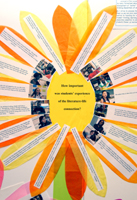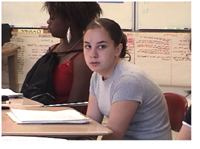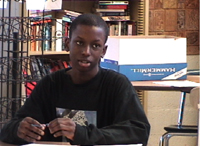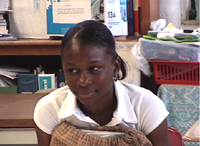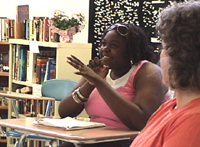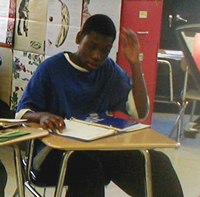3. How important was students' experience of the literature-life connection?
After looking back at the thesis statements and video of the portfolio presentations, I was struck by the realization that so much of what has been important to me in my students' learning has been about the development of their humanity. I realized that there is another throughline in my class that I've never included on any syllabus or "BIG IDEAS" poster, and that is about the way that reading and sharing about literature makes us better human beings. Alyssa wrote on her Unit Reflection, "I will remember the most in LOTF about working together. Everyone should hear everyone's ideas and work together to help each other out for survival." When I first read this comment, I thought she was talking about the ways the class worked together to end the year successfully. When I read it again, I felt she was discussing the boys on the island in LOTF. But what if she meant both? It would be wonderful if the lessons on humanity that we were reading about were being reinforced by the experience of our life in the classroom.
All of the projects that Joan and I worked on together were about making personal connections to literature and then sharing them with others. How important is it to model this kind of connecting and sharing? How important is it to create opportunities for students to articulate and share the ways they are experiencing the study of literature? Joan pushed me to do more of this and I believe it made a difference both in deepening content understanding and in deepening the closeness of the learning community.
"This book is an allegory and Ralph represents good sense and fairness that Jack, Ralph's one-time comrade, has taken. Golding is showing that the power of fear is sometimes greater than the power of reason and justice." ~ Sara
"Interpreting the book as a Freudian psychological allegory, Jack, Ralph, and Piggy personify three aspects of the human psyche: the id, the ego, and the superego, respectively. Among them, the fat, bespectacled boy Piggy represents the superego, which acts according to an absolute set of standards and stands against the id." ~ Yiwei
"The author tries to show how evil can dominate good." ~ Inae
"Piggy is often mistaken in many ways. The boys judge him by his cover and don't take the time to look deep inside of him. Piggy is an example of someone being judged by a cover." ~ Lina
"(Jack) is a person who gets his pride and dignity from other people. If he doesn't get it he puts other people down to feel better about himself. William Golding is showing that people get dignity by comparing themselves and taking dignity from others." ~ Janelle
"In the novel Lord of the Flies by William Golding, Ralph represents a democratically elected leader. Through this character William Golding is trying to show the difficulties encountered by a democratically elected leader gaining the support and cooperation of the group by doing what is best for the group as well as treating people fairly." ~ Jackson
"In this social allegory, Simon is the most complex person on the island. He is misunderstood because he's quiet but is probably the smartest. He has more wisdom on how to survive than the others. In the Lord of the Flies Simon represents independence." ~ Douglas
"In this social allegory, Ralph represents all the strong and good leaders. Through this character William Golding is trying to show that all good people or good leaders can't do anything by himself, other people have to work hard and help." ~ Sandre
"In this allegory Simon is a person who has good ideas and is wise but he doesn't know how to express himself. William Golding is saying people should try to make people like him feel more comfortable." ~ Alyssa
"Jack is a boy who represents the problem of the people. Through this character William Golding is trying to show that people who have been praised all their life, always think they come first in life: like they are number one." ~ Alisha
"The challenges and lessons that Ralph went through to become a good leader show that he represents a democratic leader. In this political allegory the challenges and lessons that a democratic leader goes through is hard because the leader has to unify the people and help them." ~ Ashley
"Ralph represents the power of fear over good leadership. Through this character, William Golding is trying to show us that no matter how encouraging or sensible a leader is, when everyone gets afraid, they no longer listen to reason." ~ Jazzmyne
"This novel is a social allegory; each character represents a type of person in society. It shows how people seem to want to go towards what they want, and not what they need. Instead of people thinking of their future, they are rushing to be happy as soon as possible and so this brings them in the wrong direction." ~ Rasmiya
"In the book Piggy represents people who get judged by the way they look. Through this character William Golding is trying to show that if you judge someone because of the way they look, you won't find out who that person really is." ~ Laura
"Through Jack, the author is trying to show that a leader who only worries about his problems and won't listen to his followers will only bring success to themselves, but not his people. . . His actions don't really help the kids and aren't necessary. In the Lord of the Flies, Jack represents an unsuccessful leader." - Jerry
"William Golding is trying to show that Piggy represents the weak person in society and why we have laws to protect them. William Golding is trying to show that without rules and laws it is easier to bully people and scare them, so they do not have to listen to someone's good ideas that would benefit them in the future." ~ Jeffrey
"Simon represents individuality. Lord of the Flies is an allegory for our social life and shows how society can be cruel, heartless, and ignorant to those with knowledge that is new to society." ~ Alexander
"In Lord of the Flies Simon represents having an independent mind. Through this character William Golding is trying to show that society treats outsiders negatively and ends up hurting or killing them. People have a hard time hearing new/different ideas from prophets or visionaries." ~ Max
"In Lord of the Flies, Simon represents the quiet, different, unknown person. Through this character William Golding is trying to show that people should never judge others by their appearance because appearances can be the opposite of what the person really is." ~ Jean
Joan:
Lord of the Flies was a wonderful choice for Jen's students at the particular moment her class began to explore it and her choice of understanding goals ensured that students would connect their lives to the work. The book has an Edenic island setting, but the serpent is always lurking. Since the text is often as dense as the growth on the uninhabited island, Jen created student groups, each of which focused its reading and thinking energies on one character in the novel. Jen's activities and assignments required her students to know intimately their particular characters and to explore the roles of all the characters in the story's various episodes. Given that within our school and certainly in the worlds surrounding school, people often strip other people of their dignity, Jen set out to use literature - this piece of literature in particular - to help her students explore their own beliefs about how people should act given that their lives are intertwined with those of others. According to Janelle, " . . . we looked at our character as not being a character but a real person." People's treatment of others, especially as it expresses their core beliefs, has much to do with whether flowers get to bloom in the first place, and then whether they get to thrive until the natural end of the growing season.
Might the book have resonated less with Jen's students had her class not read it approximately a month after the murder of a Cambridge teenager known to a number of the students? I think the students' connections to their focus characters were so strong and the issue of human dignity so important that they still would have been compelled to engage and strive. But I do think the violence in their own neighborhood and its resultant loss of young life gave the novel a relevance it might not have had otherwise. Clearly, from their points of view, the book has lessons to teach about choices, values, obligations, consequences, and rewards.



